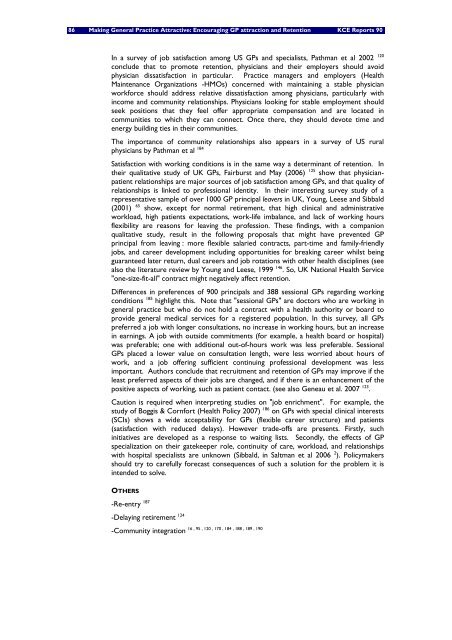Huisartsgeneeskunde: aantrekkingskracht en beroepstrouw ... - Lirias
Huisartsgeneeskunde: aantrekkingskracht en beroepstrouw ... - Lirias
Huisartsgeneeskunde: aantrekkingskracht en beroepstrouw ... - Lirias
Create successful ePaper yourself
Turn your PDF publications into a flip-book with our unique Google optimized e-Paper software.
86 Making G<strong>en</strong>eral Practice Attractive: Encouraging GP attraction and Ret<strong>en</strong>tion KCE Reports 90<br />
In a survey of job satisfaction among US GPs and specialists, Pathman et al 2002 120<br />
conclude that to promote ret<strong>en</strong>tion, physicians and their employers should avoid<br />
physician dissatisfaction in particular. Practice managers and employers (Health<br />
Maint<strong>en</strong>ance Organizations -HMOs) concerned with maintaining a stable physician<br />
workforce should address relative dissatisfaction among physicians, particularly with<br />
income and community relationships. Physicians looking for stable employm<strong>en</strong>t should<br />
seek positions that they feel offer appropriate comp<strong>en</strong>sation and are located in<br />
communities to which they can connect. Once there, they should devote time and<br />
<strong>en</strong>ergy building ties in their communities.<br />
The importance of community relationships also appears in a survey of US rural<br />
physicians by Pathman et al 184<br />
Satisfaction with working conditions is in the same way a determinant of ret<strong>en</strong>tion. In<br />
their qualitative study of UK GPs, Fairburst and May (2006) 125 show that physicianpati<strong>en</strong>t<br />
relationships are major sources of job satisfaction among GPs, and that quality of<br />
relationships is linked to professional id<strong>en</strong>tity. In their interesting survey study of a<br />
repres<strong>en</strong>tative sample of over 1000 GP principal leavers in UK, Young, Leese and Sibbald<br />
(2001) 65 show, except for normal retirem<strong>en</strong>t, that high clinical and administrative<br />
workload, high pati<strong>en</strong>ts expectations, work-life imbalance, and lack of working hours<br />
flexibility are reasons for leaving the profession. These findings, with a companion<br />
qualitative study, result in the following proposals that might have prev<strong>en</strong>ted GP<br />
principal from leaving : more flexible salaried contracts, part-time and family-fri<strong>en</strong>dly<br />
jobs, and career developm<strong>en</strong>t including opportunities for breaking career whilst being<br />
guaranteed later return, dual careers and job rotations with other health disciplines (see<br />
also the literature review by Young and Leese, 1999 146 . So, UK National Health Service<br />
"one-size-fit-all" contract might negatively affect ret<strong>en</strong>tion.<br />
Differ<strong>en</strong>ces in prefer<strong>en</strong>ces of 900 principals and 388 sessional GPs regarding working<br />
conditions 185 highlight this. Note that "sessional GPs" are doctors who are working in<br />
g<strong>en</strong>eral practice but who do not hold a contract with a health authority or board to<br />
provide g<strong>en</strong>eral medical services for a registered population. In this survey, all GPs<br />
preferred a job with longer consultations, no increase in working hours, but an increase<br />
in earnings. A job with outside commitm<strong>en</strong>ts (for example, a health board or hospital)<br />
was preferable; one with additional out-of-hours work was less preferable. Sessional<br />
GPs placed a lower value on consultation l<strong>en</strong>gth, were less worried about hours of<br />
work, and a job offering suffici<strong>en</strong>t continuing professional developm<strong>en</strong>t was less<br />
important. Authors conclude that recruitm<strong>en</strong>t and ret<strong>en</strong>tion of GPs may improve if the<br />
least preferred aspects of their jobs are changed, and if there is an <strong>en</strong>hancem<strong>en</strong>t of the<br />
positive aspects of working, such as pati<strong>en</strong>t contact. (see also G<strong>en</strong>eau et al. 2007 123 .<br />
Caution is required wh<strong>en</strong> interpreting studies on "job <strong>en</strong>richm<strong>en</strong>t". For example, the<br />
study of Boggis & Cornfort (Health Policy 2007) 186 on GPs with special clinical interests<br />
(SCIs) shows a wide acceptability for GPs (flexible career structure) and pati<strong>en</strong>ts<br />
(satisfaction with reduced delays). However trade-offs are pres<strong>en</strong>ts. Firstly, such<br />
initiatives are developed as a response to waiting lists. Secondly, the effects of GP<br />
specialization on their gatekeeper role, continuity of care, workload, and relationships<br />
with hospital specialists are unknown (Sibbald, in Saltman et al 2006 2 ). Policymakers<br />
should try to carefully forecast consequ<strong>en</strong>ces of such a solution for the problem it is<br />
int<strong>en</strong>ded to solve.<br />
OTHERS<br />
-Re-<strong>en</strong>try 187<br />
-Delaying retirem<strong>en</strong>t 124<br />
-Community integration<br />
16 , 95 , 120 , 170 , 184 , 188 , 189 , 190

















